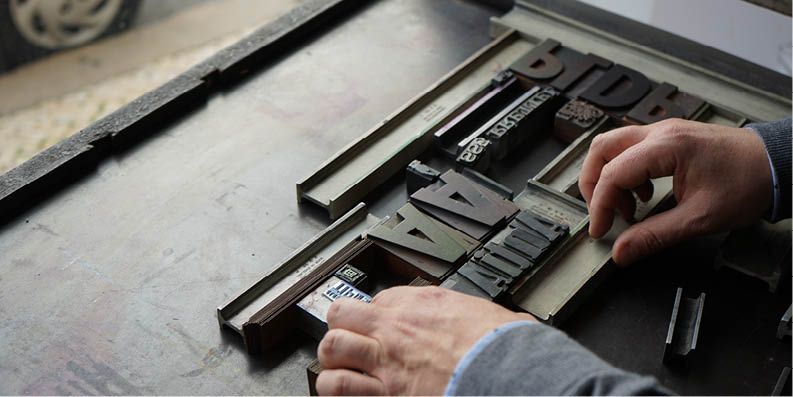The developed workshops sought to extrapolate material/conceptual elements from studied cultures for dynamic reuse in non-conventional scenarios. The activities conducted under this ambit focused on the employment of design and communication led strategies for product innovation, and public acknowledgement
and reinscription of traditional knowledge embedded in the studied contexts. The workshops were thus tactical in nature, developed with the intention of producing short and medium terms outcomes that could allow contemporary design to make meaningful contributions to the studied context of traditional making.
At Tipografia Damasceno, there were conducted two letterpress printing workshops with participation of undergraduate students of Graphic Design from the Polytechnic Institute of Cávado and Ave, and doctoral students of design from the Faculty of Fine Arts, University of Porto, which were aimed at producing contemporarily significant cultural content through traditional means, thereby, connecting students with their own creative heritage.
The workshops sought to showcase deep-rooted historical and cultural significance and unique materiality of Almalaguês weaving and gain a wider outreach for the craft through incorporating packaging design as an articulated strategy for communication. The pedagogic intervention was formulated to consider both the overall material / visual context of the craft and the physicality of typical Almalaguês products towards developing potential solutions. In addition, the students were also encouraged to develop packaging design concepts for hypothetical articles made from the handloom textile, in order to envision new territories for implementation.
A set of two online workshops with undergraduate students of graphic design from the Polytechnic Institute of Cávado and Ave, which were organised in collaboration with Azulejos do Porto and aimed at exploring graphic design principles towards conceptualizing new collateral materials such as packaging, tags, labels, and handbills: that could be utilized by a variety of tourism related industries towards spreading awareness regarding the uniqueness and cultural legacy of Azulejos tile making.
An ideation workshop aimed at identifying new and culturally, economically, and environmentally sustainable product categories for the weaving craft of Almalaguês was organised with Masters students of Industrial Design at the Faculty of Engineering, University of Porto, under the subject of Eco-design and sustainability The results were correspondingly shared with Herança do Passado, the representative organisation for Almalaguês weaving.
A workshop ‘Binary Tiles’ with Masters students of Multimedia from University of Porto was held wherein the participants were encouraged to explore the semantic paradoxes between convention and contemporaneity by reproducing digital codification through Azulejos tile-art.

The developed workshops sought to extrapolate material/conceptual elements from studied cultures for dynamic reuse in non-conventional scenarios. The activities conducted under this ambit focused on the employment of design and communication led strategies for product innovation, and public acknowledgement and reinscription of traditional knowledge embedded in the studied contexts. The workshops were thus tactical in nature, developed with the intention of producing short and medium terms outcomes that could allow contemporary design to make meaningful contributions to the studied context of traditional making.
At Tipografia Damasceno, there were conducted two letterpress printing workshops with participation of undergraduate students of Graphic Design from the Polytechnic Institute of Cávado and Ave, and doctoral students of design from the Faculty of Fine Arts, University of Porto, which were aimed at producing contemporarily significant cultural content through traditional means, thereby, connecting students with their own creative heritage.
The workshops sought to showcase deep-rooted historical and cultural significance and unique materiality of Almalaguês weaving and gain a wider outreach for the craft through incorporating packaging design as an articulated strategy for communication. The pedagogic intervention was formulated to consider both the overall material / visual context of the craft and the physicality of typical Almalaguês products towards developing potential solutions. In addition, the students were also encouraged to develop packaging design concepts for hypothetical articles made from the handloom textile, in order to envision new territories for implementation.
A set of two online workshops with undergraduate students of graphic design from the Polytechnic Institute of Cávado and Ave, which were organised in collaboration with Azulejos do Porto and aimed at exploring graphic design principles towards conceptualizing new collateral materials such as packaging, tags, labels, and handbills: that could be utilized by a variety of tourism related industries towards spreading awareness regarding the uniqueness and cultural legacy of Azulejos tile making.
An ideation workshop aimed at identifying new and culturally, economically, and environmentally sustainable product categories for the weaving craft of Almalaguês was organised with Masters students of Industrial Design at the Faculty of Engineering, University of Porto, under the subject of Eco-design and sustainability The results were correspondingly shared with Herança do Passado, the representative organisation for Almalaguês weaving.
A workshop ‘Binary Tiles’ with Masters students of Multimedia from University of Porto was held wherein the participants were encouraged to explore the semantic paradoxes between convention and contemporaneity by reproducing digital codification through Azulejos tile-art.
The project “Anti-Amnésia: Investigação em Design como agente para a regeneração e reinvenção, narrativas e materiais, de culturas e técnicas de manufactura portuguesas em desaparecimento” (POCI-01-0145-FEDER-029022) is supported by Competitiveness and Internationalisation Operational Programme (POCI), under the PORTUGAL 2020 Partnership Agreement, through the European Regional Development Fund (ERDF) and through national funds by the FCT – Fundação para a Ciência e a Tecnologia.